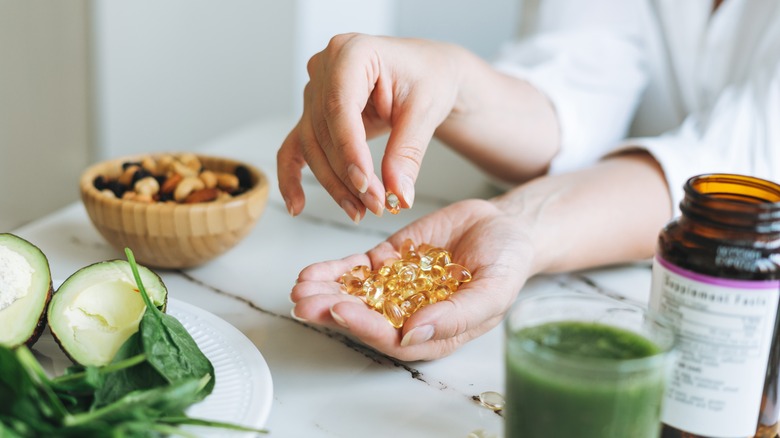The Vitamins You Should Be Taking In Your 40s
As we age, it seems like the media tells us that we're in dire need of everything to maintain our health — longer walks, more milk, better skin cream, and fewer calories. While this can feel overwhelming, it's true that with age comes more needs and additional responsibility, and that includes focusing on our health.
Aging is associated with many changes in the body, such as muscle loss, thinner skin, bone loss, reduced stomach acid production, and reduced nutrient absorption (via Healthline). As we get older, it becomes even more important to eat healthy and stay active. Since we typically exercise less frequently and develop less muscle mass as we age, our need for calories decreases. However, we still have a high need for nutrients, making it difficult to ensure we're getting everything we need. That's where vitamins and supplements come in, but it can be hard to know where to start.
Vitamins and supplements for your 40s
Since our skin naturally thins as we get older, it becomes more difficult to make vitamin D (via the Journal of Advanced Research). We also tend to get outside less, reducing our exposure to sunlight. It's difficult for anyone to get enough vitamin D from the environment and nutrition, and as such, we have a need for vitamin D supplements as we age. This is especially the case in our 40s (via The Healthy). Vitamin D deficiencies have been linked to cancer, autoimmune conditions, diabetes, and obesity. "Get your blood levels of vitamin D tested to see where you stand and supplement accordingly," Dr. Suzanne Steinbaum of Mount Sinai Hospital told The Healthy.
Since a vitamin D deficiency can also lead to a reduction in calcium absorption, it's also important to get enough calcium (via Healthline). We need calcium to keep our bones strong, especially as we age. It can be beneficial to increase your dairy and dark, leafy greens intake, or take a calcium supplement.
It's also important to make sure you're getting omega-3 fatty acids through means, such as fish oil (via Healthline). These have been shown to reduce the risk of heart disease, which increases as we age.


